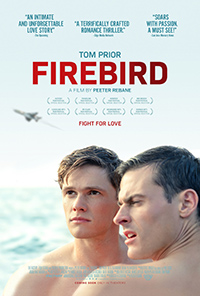Bird on a Wire: Rebane Resurrects a Familiar Stymied Love Affair in Absurd Melodrama
 Over a century ago, Lord Alfred Douglas coined the euphonious phrase ‘the love that dare not speak its name’ in place of the stigmatized, criminalized and eventually reappraised distinction of homosexuality. Despite eventual leaps and bounds of progression towards equality, cinema serves as something of a barometer reflecting cultural tastes and possibilities, as far as depictions go. Rolling back the significant erasure of queer lives and experiences does require a certain amount of overlap and familiarity as visibility saturates and normalizes specific perspectives. As such, this familiarity breeds a certain roteness as pertains to seminal queer experiences as time, and cinema, goes on. However, roteness is no excuse for something as egregiously bland and bungled as Firebird, the directorial debut of Estonian director Peeter Rebane.
Over a century ago, Lord Alfred Douglas coined the euphonious phrase ‘the love that dare not speak its name’ in place of the stigmatized, criminalized and eventually reappraised distinction of homosexuality. Despite eventual leaps and bounds of progression towards equality, cinema serves as something of a barometer reflecting cultural tastes and possibilities, as far as depictions go. Rolling back the significant erasure of queer lives and experiences does require a certain amount of overlap and familiarity as visibility saturates and normalizes specific perspectives. As such, this familiarity breeds a certain roteness as pertains to seminal queer experiences as time, and cinema, goes on. However, roteness is no excuse for something as egregiously bland and bungled as Firebird, the directorial debut of Estonian director Peeter Rebane.
Based on the memoir of Sergey Fetisov, it’s a film which has the mind boggling audacity to diminish its subject’s experiences to a subpar algorithm of queer love cliches in the closet. Filmed in English, its actors awkwardly chewing through bland dialogue with iffy accents, (which is sometimes a blight diminished by other collaborative assets inherent in filmmaking) the woeful script penned by lead star Tom Prior is basic and adolescent, calibrated to satisfy only the lowest common denominator of audiences seeking indie LGBTQ+ content.
In 1977 Soviet Occupied Estonia, Sergey Serebrennikov (Tom Prior) is a young soldier serving his last tour, despite the offers of his commander, Col. Kuznetsov (Nicholas Woodeson). He carries a light flirtation with his fellow comrade Luisa (Diana Pozharskaya) but his dreams of attending drama school in Moscow are dictating his next chapter in life. When Roman Matvejev (Oleg Zagorodnii), a handsome fighter pilot, arrives on base, Sergey is smitten. However, homosexuality is illegal under Communism’s dictates, and Roman soon finds the risk of discovery too hot to handle as their romance blossoms. Several years pass after Sergey heads to Moscow, returning for a wedding ceremony between Luisa and Roman. During the ceremony, their relationship is rekindled, but they discover there’s more at risk than they anticipated.
It’s immediately clear any semblance of authenticity is impossible once Firebird begins to unspool, as clunky, accented dialogue flies between actors who are also a bit miscast as soldiers. Hair and make-up choices clash with lighting in several sequences (though nothing beats a parodic fright wig Prior dons in the third act), and it’s as if the film itself takes a sigh of relief when it can stray away from the military base to the community theater of Moscow. Clearly without the necessary budget for its special effects, the blasting off of rockets (attempting to cheekily imply orgasm), a sequence in the control room command center is exceptionally distracting, and a disservice for a fine character actor like Nicholas Woodeson (who might be emblazoned in some minds for terrorizing Julia Roberts in The Pelican Brief).
How Firebird compares to something like the recent Russian title Brothers in Every Inch, for instance (which navigates a codependent masculine relationship amid fighter pilot school), showcases the lack of finesse on all levels in this film. Resembling queersploitation more than anything, seeing as how it bludgeons one man’s meaningful love affair into mealy, forgettable pulp, regarding it either as a metaphor for the unmanned aircraft or the Slavic mythical creature, Firebird needs to be rebuilt from scratch.
Clearly crafted and intended to showcase the talents of Tom Prior, breaking out from supporting roles for his self-serving star vehicle, he inadvertently negates the memory of his subject in a botched exercise which also fails to correctly characterize Soviet Occupied Estonia and the country’s relationship to the Soviet Union in this period (and no, a misplaced use of the Boney M. classic Rasputin is not enough). To be fair, co-stars Oleg Zagorodnii and Diana Pozharskaya don’t fare much better under Rebane’s direction while uttering Prior’s dialogue, but their anguish feels less catastrophically miscalculated. They’re a perfect example of how accent work often causes an emotional dissociation with characterization (and, lack of chemistry).
In its final frames, there’s a sense of the bitterness and sadness which more likely captures Fetisov’s clandestine relationship in a line read omnisciently in a farewell letter, “Our love could only exist where there is no thought and no time.” If only a semblance of this sentiment had been captured in the film’s halting odyssey through conventional hokum.
★/☆☆☆☆☆


